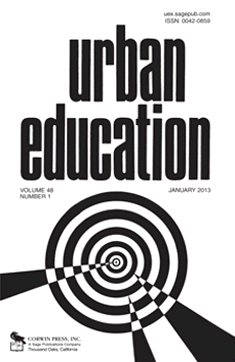
URBAN EDUCATION
Scope & Guideline
Navigating the Complexities of City Education.
Introduction
Aims and Scopes
- Equity and Social Justice in Education:
The journal consistently focuses on issues of equity, particularly as they relate to marginalized communities in urban settings. It explores how systemic inequalities impact educational opportunities and outcomes for students of color, low-income families, and immigrant populations. - Culturally Responsive Pedagogy:
A significant scope of the journal involves research on culturally sustaining and responsive teaching practices that acknowledge and incorporate the cultural backgrounds of students. This includes examining how educators can better serve diverse student populations through inclusive pedagogical practices. - Community Engagement and School-Community Partnerships:
The journal emphasizes the importance of community involvement in education, highlighting collaborative efforts between schools and their surrounding communities. This includes studies on community schools, parent engagement, and the role of community resources in supporting student success. - Critical Race Theory and Intersectionality:
Research published in 'Urban Education' frequently employs critical race theory and intersectional frameworks to analyze educational phenomena. This includes examining how race, class, gender, and other identities intersect to shape students' educational experiences and outcomes. - Teacher Preparation and Professional Development:
The journal addresses the preparation of educators to work effectively in urban settings, focusing on the development of culturally relevant teaching practices and the challenges faced by teachers of color in predominantly white institutions.
Trending and Emerging
- Mental Health and Well-Being in Schools:
A notable trend is the increasing focus on the mental health and well-being of students and educators, particularly in the aftermath of the COVID-19 pandemic. This includes research on trauma-informed practices and the psychological impact of systemic inequities. - Youth Activism and Agency:
There is a rising emphasis on youth activism, particularly among students of color, and their roles in advocating for social justice within educational settings. This includes studies on student voice and participatory action research. - Intersectional Approaches to Education:
Publications are increasingly exploring intersectional frameworks that consider how overlapping identities (race, gender, sexuality, etc.) affect educational experiences. This reflects a broader recognition of the complexities of identity in shaping student outcomes. - Impact of Technology on Learning:
Emerging research is examining the role of technology in urban education, particularly in facilitating learning for marginalized students. This includes studies on digital equity, remote learning, and the integration of technology in culturally relevant pedagogy. - Community-Based and Participatory Research:
There is a growing interest in community-based research methodologies that engage local stakeholders in the research process. This trend underscores the importance of context and collaboration in addressing educational challenges.
Declining or Waning
- Traditional Disciplinary Practices:
There appears to be a waning interest in traditional punitive disciplinary practices, as the focus shifts towards restorative justice and trauma-informed approaches to discipline in urban schools. - Standardized Testing and Accountability Measures:
The discourse surrounding standardized testing and high-stakes accountability has decreased, likely due to a growing recognition of the limitations of these measures in addressing educational inequities. - Generalized Educational Policy Analysis:
There is a decline in publications centered on broad educational policy analysis without a critical lens. The journal is increasingly prioritizing research that connects policy to the lived experiences of marginalized communities.
Similar Journals

AUSTRALIAN EDUCATIONAL RESEARCHER
Elevating Educational Discourse with Cutting-Edge ResearchAustralian Educational Researcher, an esteemed publication within the field of education, is published by Springer and serves as a vital platform for the dissemination of high-quality research in educational practice and policy. With an impressive Q1 ranking in the 2023 category of Education and a remarkable Scopus rank placing it in the top 20% of its field, this journal provides a prestigious venue for scholars aiming to influence educational outcomes and reforms. Spanning over three decades, from 1985 to 1996 and then again from 2003 to 2024, the journal features a diverse array of research articles that tackle critical issues in education, catering to a wide audience of researchers, educators, and policymakers. Potential contributors and readers will appreciate its commitment to advancing knowledge and improving educational practices, further fostering a community dedicated to educational excellence.

EDUCATIONAL LEADERSHIP
Exploring Innovative Pathways in Educational LeadershipEDUCATIONAL LEADERSHIP, published by the Association for Supervision and Curriculum Development, is a pivotal journal in the field of education, focusing on innovative practices and theories that shape educational leadership today. Established in 1976, this journal addresses critical issues surrounding curriculum development, supervision, and effective leadership strategies within educational institutions. Although it currently does not offer open access, it remains an essential resource for researchers, educators, and administrators seeking to enhance their understanding of educational dynamics and improve school effectiveness. The journal's impact is underscored by its Scopus ranking, placing it 1017 out of 1319 in the Social Sciences Education category. The absence of a current HIndex in the data indicates an opportunity for further citation engagement and scholarly recognition. Additionally, while coverage in Scopus has been discontinued as of 2019, the legacy of EDUCATIONAL LEADERSHIP continues to influence educational practices worldwide, making it an invaluable asset for those dedicated to advancing the field of education.

INSTRUCTIONAL SCIENCE
Advancing educational excellence through rigorous research.INSTRUCTIONAL SCIENCE is a premier academic journal published by Springer that focuses on advancing the field of education through research in instructional methodologies and practices. With an ISSN of 0020-4277 and an E-ISSN of 1573-1952, this journal is recognized for its rigorous scholarly contributions, evident in its impressive 2023 impact factor that places it in the top quartile (Q1) for both Developmental and Educational Psychology and Education. Situated in the Netherlands, the journal has a comprehensive publication history from 1972, making it a respected source for researchers seeking to explore innovative teaching strategies and learning processes. Its Scopus rankings further reflect its esteemed position, ranking #285 out of 1543 in Social Sciences – Education and #99 out of 360 in Psychology – Developmental and Educational Psychology, highlighting its relevance and impact within these fields. While currently not offering Open Access, INSTRUCTIONAL SCIENCE remains a vital resource for educators, psychologists, and students who are committed to fostering effective learning environments through evidence-based practices.

Multicultural Education Review
Championing Cultural Awareness in Academic DiscourseWelcome to the Multicultural Education Review, an esteemed academic journal published by ROUTLEDGE JOURNALS, TAYLOR & FRANCIS LTD. As a prominent resource in the fields of Anthropology and Education, this journal aims to foster the understanding of multicultural perspectives in educational practices. With a robust impact factor and recognition in the Q1 and Q2 quartiles across its categories, the journal offers a vital platform for researchers, educators, and students to share innovative studies and discussions related to multicultural education. Though operating under a subscription model, the journal's content is pivotal for advancing scholarship and dialogue in diverse educational contexts. Since its inception in 2009, the journal continues to shape the discourse on inclusivity, equity, and cultural diversity, ensuring eligibility for a broad readership keen on addressing contemporary educational challenges.
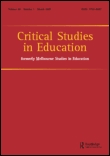
Critical Studies in Education
Shaping the future of educational scholarship.Critical Studies in Education, published by Routledge Journals, Taylor & Francis Ltd, is a leading journal in the field of education, with a distinguished Q1 ranking in the 2023 category quartiles. This esteemed journal, accessible to scholars in the United Kingdom and internationally, showcases cutting-edge research and critical perspectives on educational practices, theories, and policies, addressing the complex dynamics shaping contemporary education. With an impressive Scopus rank of #51 out of 1543 within the Social Sciences Education category, it places itself in the 96th percentile, underscoring its significant impact within the academic community. Researchers, educators, and students will find in-depth articles that challenge conventional thought and promote innovative approaches to learning and pedagogy, ensuring that Critical Studies in Education remains an essential resource for those dedicated to advancing educational scholarship and practice from 2008 through to 2024.
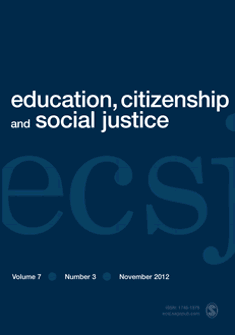
Education Citizenship and Social Justice
Illuminating pathways to educational justice.Education Citizenship and Social Justice is a prominent academic journal published by SAGE Publications Inc, dedicated to advancing the discourse around education's role in citizenship and social justice issues. Since its inception in 2006, the journal has provided a critical platform for researchers, educators, and policymakers to explore the intersections of education, citizenship, and equity within diverse societal contexts. With an impressive ranking of #685 out of 1543 in the Social Sciences - Education category and a 2023 Quartile 2 status, it is firmly established as a significant resource in its field. Although the journal does not currently operate with an open access model, its impact on the education sector remains profound, offering valuable insights that contribute to the development of inclusive educational practices. Researchers and students alike will find the journal's rigor and commitment to social justice principles vital as they navigate the evolving landscape of educational research and policy.
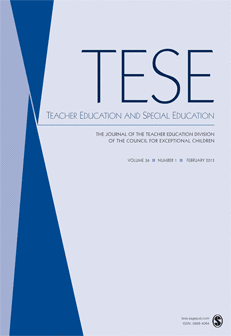
Teacher Education and Special Education
Fostering Excellence in Teacher and Special EducationTeacher Education and Special Education, published by SAGE Publications Inc, stands as a premier journal in the field of education, particularly focusing on the nuances and complexities of teacher education while addressing the needs of special education. With an impressive 2023 impact factor reflected in its Q1 quartile ranking, the journal occupies a vital position in the Scopus Ranks, rated at Rank #112 out of 1543 which places it within the 92nd percentile of its category. The journal publishes high-quality, peer-reviewed research aimed at enhancing educational practices and policy reforms to support diverse learning needs, striving to foster an inclusive educational environment. Although not currently open access, the journal offers a wealth of scholarly articles from 2015 onwards, making it a go-to resource for researchers, educators, and students aiming to stay at the forefront of educational advancements in the United Kingdom and globally. For those engaged in the vital work of teacher training and special education, this journal serves as an indispensable guide and a platform for innovative ideas and evidence-based practices.

Cultural Studies of Science Education
Revolutionizing Science Education with Cultural InsightsCultural Studies of Science Education, published by Springer, is a leading journal in the field of cultural studies, with a specific focus on the intersection of science education and cultural analysis. With an ISSN of 1871-1502 and an E-ISSN of 1871-1510, this journal has demonstrated its commitment to high-quality research, evidenced by its impressive Q1 ranking in 2023 within the Cultural Studies category and a notable position in the 93rd percentile in Scopus Ranks for Social Sciences. Covering a wide array of interdisciplinary topics, the journal seeks to advance the understanding of how scientific knowledge and education are shaped by cultural contexts, making it a vital resource for researchers, educators, and policy makers. Operating from the Netherlands, the journal embraces an open access philosophy to ensure that cutting-edge research is accessible to all, fostering collaboration and innovation in the field. As we converge years from 2006 to 2024, Cultural Studies of Science Education continues to explore critical issues and innovative methodologies, aiming to inspire and inform the next generation of scholars and practitioners.
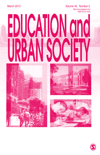
EDUCATION AND URBAN SOCIETY
Connecting Scholars to Urban Educational DynamicsEDUCATION AND URBAN SOCIETY is a prestigious academic journal published by SAGE PUBLICATIONS INC, focusing on the intersection of education and urbanization, integral to understanding contemporary societal dynamics. Since its inception in 1968, the journal has maintained a commitment to publishing high-quality research that informs policy, practice, and scholarship within the fields of Education and Urban Studies. With a notable impact factor reflected in its Q2 rankings for both categories in 2023 and a strong standing in Scopus rankings, the journal serves as a critical platform for researchers and practitioners seeking to address the complex challenges facing urban education systems. Although it does not currently offer open access, the journal ensures wide dissemination of knowledge through its rigorous peer-reviewed processes, making it an essential resource for anyone involved in the study or practice of education in urban contexts. For scholars aiming to explore the revolutionary changes in these fields leading up to 2024 and beyond, EDUCATION AND URBAN SOCIETY continues to be a vital source of innovative research and discourse.
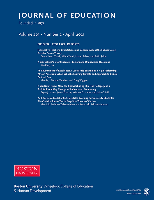
Journal of Education-US
Exploring diverse methodologies to enhance learning.Journal of Education-US, published by SAGE Publications Inc, is an esteemed academic journal dedicated to advancing the field of education through rigorous research, theoretical discourse, and diverse methodologies. With both print (ISSN: 0022-0574) and digital (E-ISSN: 2515-5741) formats available, this journal serves as a vital resource for educators, researchers, and policy-makers alike. The journal is classified in the Q2 quartile for Arts and Humanities and Q3 for Education as of 2023, reflecting its influence within the academic community. It holds a respectable rank of #908 out of 1543 in the Scopus database within the Social Sciences Education category, indicating its relevance and contribution to ongoing debates and innovations in educational practices and theories. While not currently an open-access journal, its carefully curated articles provide valuable insights and foster critical discussions that drive the education sector forward. With a publication span from 2005 and ongoing, the Journal of Education-US remains a cornerstone for impactful scholarship in education.